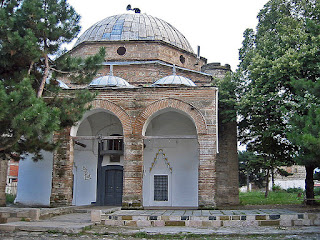Mirahori mosque in Korça.
A recent Pew Research Center demographic study put the percentage of Muslims in Albania at 79.9%.[2] However, a recent Gallup poll gives percentages of religious affiliations with only 43% Muslim, 19% Eastern Orthodox, 15% Catholic and 23% atheist or nonreligious.[3] In the 2011 census the declared religious affiliation of the population was: 56.70% Sunni Muslims, 2.09% Bektashis, 10.03% Catholics, 6.75% Orthodox, 0.14% Evangelists, 0.07% other Christians, 5.49% believers without denomination, 2.05% Atheists, 13.79% undeclared.[4] 65% of Albanian Muslims are non-denominational Muslims.[5]
History
Ottoman periodIslam came to Albania through the Ottoman Empire in the 14th century. In the North, the spread of Islam was slower due to resistance from the Roman Catholic Church and the mountainous terrain which contributed to curb Muslim influence. In the center and south, however, by the end of the seventeenth century the urban centers had largely adopted the religion of the growing Albanian Muslim elite. The existence of an Albanian Muslim class of pashas and beys who played an increasingly important role in Ottoman political and economic life became an attractive career option for most Albanians.
The Muslims of Albania were divided into two main communities: those associated with Sunni Islam and those associated with the Bektashi Sufis, a mystic Dervish order that came to Albania during the Ottoman period, primarily during the 18th and 19th centuries. The Bektashi sect is considered heretical by most mainstream Muslims. Historically Sunni Islam found its strongest base in northern and central Albania, while Bektashis were found primarily in the Tosk lands of the south.
During Ottoman rule the Albanian population gradually began to convert to Islam through the teachings of Bektashism, in order to gain considerable advantages in the Ottoman trade networks, bureaucracy and army. Many Albanians were recruited into the Ottoman Janissary and Devşirme and 42 Grand Viziers of the Ottoman Empire were of Albanian origin. The most prominent Albanians during Ottoman rule were: Koca Davud Pasha, Hamza Kastrioti, Iljaz Hoxha, Nezim Frakulla, Köprülü Mehmed Pasha, Ali Pasha, Edhem Pasha, Haxhi Shehreti, Ali Pasha of Gucia, Ibrahim Pasha of Berat, Köprülü Fazıl Ahmed, Muhammad Ali of Egypt, Kara Mahmud Bushati, Ahmet Kurt Pasha.
Independence
The country won its independence from the Ottoman Empire in 1912. Following the National Renaissance tenets and the general lack of religious convictions[citation needed], during the 20th century, the democratic, monarchic and later the communist regimes followed a systematic dereligionization of the nation and the national culture. Due to this policy, as all other faiths in the country, Islam underwent radical changes.
In 1923, following the government program, the Albanian Muslim congress convened at Tirana decided to break with the Caliphate, established a new form of prayer (standing, instead of the traditional salat ritual), banished polygamy and the mandatory use of veil (hijab) by women in public, practices forced on the urban population by the Ottomans.[6][7]
The Muslim clergy, following suit with the Catholic and Orthodox clergy, was totally eradicated during the communist regime of Enver Hoxha who declared Albania the only non-religious country in the world, banning all forms of religious practice in public in 1967.
Today Albania is the only entirely European member of the Organisation of Islamic Cooperation.[8]
In April 2011, Bedër University, Albania's first Islamic university was opened in Tirana.[9]

No comments:
Post a Comment